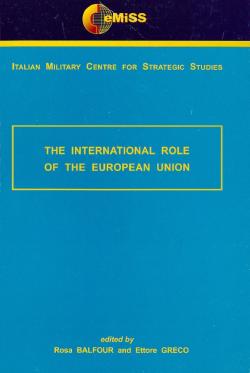The International Role of the European Union

In recent years, the international commitments of the European Union have grown considerably, above all, in sectors such as commerce, aid given to the development and civil reconstruction of countries devastated by conflicts. On the whole however, the international role of the European Union is still weak, well under the expectations of the public opinion. Not only does it not yet have the adequate potential and resources to carry out large scale military action, but often, owing to the weakness of its institutional means, and divergences among Member States, it is not capable of carrying out coherent and effective diplomatic action. Several crucial questions regarding the identity of the European Union itself as international protagonist remain open. Is it auspicable that the Union, which today, is principally a civil and economic power, also become a military power? Will the European States elaborate a real common strategy of foreign policy? Will they be able to adopt new, common organs and instruments capable of guaranteeing a more efficient European presence in principal international affairs? Is it realistic to presume that the present reticence by governments, to transfer decision-making power in the foreign policy sector to Brussels, will be overcome? In this volume, Italian and foreign experts have contributed in attempting to answer these and other questions regarding the future of European foreign policies. The authors have analysed the foreign activity of the European Union in its various forms, highlighting the interconnections, the strong and weak points and the potential for development. Not only are the institutional and decision-making mechanisms of the Common Foreign and Security Policy (CFSP) examined, but also the relationship between the last mentioned and other European Union foreign policies - in particular those that come within the pillar of the Community. Moreover, the impact that policies on justice and internal affairs may have outside the Union, are also evaluated. A section of this work is then dedicated to examining several, specific foreign policies of the Union - its enlargement, initiatives in the Balkans and the Mediterranean, relations with the USA - with a particular analysis of the concrete results that have been obtained and the performance of the various organs of the Union involved. Furthermore, in the introductory and concluding chapters of this volume, the two editors, summarising the results of the research, make some considerations regarding the identity of the Union as international protagonist and the future evolution of European foreign policy.
Volume prepared by the Centro studi di politica internazionale (CeSPI) and the Istituto Affari Internazionali (IAI) on behalf of the Centro militare di studi strategici (CeMiSS). Published also in Italian: Il ruolo internazionale dell'Unione europea, Roma, Artistic&Publishing Company, April 2002, 362 p. (Collana CeMiSS ; 23), ISBN 88-88391-34-7 ; 978-88-88391-34-2.
Preface, p. 3-4
Introduction
Evaluating the EU's International Role, by Rosa Balfour, p. 7-25
Part One. The Institutional Dimension of CFSP: Actors and Decision-Making
1. CFSP/ESDP Decision-Making Mechanisms, by Franco Algieri, p. 29-45
2. The Role of CFSP High Representative and the Policy Planning and Early Warning Unit, by Raffaella Circelli, p. 47-73
Part Two. States, Pillars and Policy Fields
3. CFSP/ESDP: Coherence as a Challenge, Flexibility as a Method, Effectiveness as a Goal, by Antonio Missiroli, p. 77-102
4. The Asymmetrical Fortress: The Problem of Relations Between Internal and External Security Policies in the European Union, by Ferruccio Pastore, p. 103-125
5. The Single Currency at the Service of the Common Foreign and Security Policy? , by Daniel Gros, p. 127-145
6. Structure and National Interest in the Development of CFSP-ESDP, by Julian Lindley-French, p. 147-166
Part Three. The EU Meets Its Tests: Foreign Policy in the Making
7. Enlargement to Central and Eastern Europe as a Foreign and Security Policy, by Barbara Lippert, p. 169-194
8. The Role of the EU in the Mediterranean and the Future of the Euro-Med Partnership, by Roberto Aliboni, p. 195-210
9. The Enlargement-Foreign Policy Gap: The Case of Turkey, by Nathalie Tocci, p. 211-237
10. Testing EU Foreign Policy in the Balkans. Capabilities and Policies in Responding to the 2001 Armed Conflict in Macedonia (FYROM), by Mario Zucconi, p. 239-254
11. The EU and Transatlantic relations: The Evolution of CFSP/ESDP in the Euro Era, by Roberto Menotti, p. 255-294
Conclusions
Prospects for Development and Reform of the European Union's Foreign Policy, by Ettore Greco, p. 295-306
Abbreviations, p. 307-308
Topic
Tag
Related content
-
Publication19/08/2015
Il ruolo internazionale dell'Unione europea
leggi tutto -
Ricerca11/01/2015
La politica estera e di sicurezza europea: sviluppi politici e istituzionali e il ruolo dell'Italia
leggi tutto


